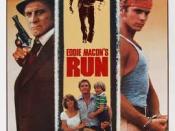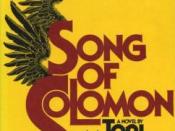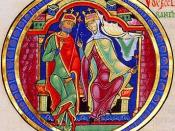Morrison in her essay 'Rootedness' emphasises the importance of the ancestral myth, she writes bluntly, 'when you kill the ancestor you kill yourself.' This is certainly true for Macon Dead in Song of Solomon. Macon has rejected his heritage for materialism and as a result remains a most discontented man despite the wealth produced by his materialistic values. Macon's unhappiness with his materialistic life is seen in the novel when he 'turned his back and walked slowly towards Pilate's house' where he feels the 'irritability of the day drain away from him'. However Macon does not will himself to change and thus continues his bitter life. Milkman on the other hand perseveres because he rejects the materialistic values injected upon him by his father when he embraces his personal and ancestral past this in turn permits him to connect with his community and allows him to truly live.
There are many instances in Morrison's novel 'song of Solomon' where events are not made unambiguous.
One example is when Macon invites relieves the memory of his wife's 'mouth on the dead man's finger's'. From Macon's tone the reader's are forced to associate this image with something of a sexual nature despite never being told that Ruth was indeed engaged in such an act. Morrison in her essay 'Rootedness' explained that in order to fulfil her aim of giving the story a more oral feel she had to 'provide the places and spaces so that the reader can participate',. Thus when describing intimate scenes such as Macon recollection of his lovemaking with his wife, and Milkman and his intimacy with Sweet, she intended the reader to 'bring his own sexuality in the scene' and consequently interacting in 'a very personal way'. Thus the reader's have been given the chance by Morrison...



Excellent
You really know how to use secondary material, but remember it's also good to keep your analysis short and sweet! Excellent use of secondary information though! I really love the novel Song of Solomon and reccomend people read it.
10 out of 10 people found this comment useful.